Milk is a common food item in many people’s household. It goes well with CKD Friendly Cereals or can be used to make other dishes like oatmeal. If you like to bake, you may need to use milk in your recipes (hello Blueberry Muffins!). However, finding a kidney friendly milk can be tricky for people with Chronic Kidney Disease.
This post may contain affiliate links through which we may earn a small commission to help keep this website free.
Skip the ads: Kidney Foodie Academy members can access ALL of the Kidney Foodie Grocery Shopping Guides ad-free by visiting this section of the library. Not a member? Learn more about Kidney Foodie Academy here.
Table of contents
What makes a milk kidney friendly?
Protein
If you have Chronic Kidney Disease and are not on dialysis, one of the main things you need to consider when choosing a milk is the protein content. One cup of regular cow’s milk can contain 8g of protein. Depending on your unique needs, that could be 20% of your recommended protein intake for the day! In my experience, most people would prefer to get their protein from other sources.
Not confident that you’re eating the right amount of protein each day? A registered dietitian and Board Certified Specialist in Renal Nutrition can help with that! Request an appointment today.
Too much protein can be hard on your kidneys. Too much protein can increase pressure in your kidneys. This can cause you to leak more protein into your urine than you should, and protein leakage is typically considered a sign that your kidneys may be declining fast. Additionally, protein from animal sources (like milk) contribute more to metabolic acidosis than the proteins found in plant based foods.
Many (but not all!) plant based milks will be low in protein which will make them better choices for a kidney friendly diet.
Phosphorus
Phosphorus is a mineral found in many foods that can cause problems with people who have CKD. Too much phosphorus is associated with increased risk of coronary artery calcification (even in people with normal renal function!).
Although regular dairy milk does contain natural phosphorus, the bigger concern for people with CKD are foods that contain phosphorus additives. Phosphorus additives are highly absorbable by the body and can quickly drive up phosphorus levels in the body (although you will not always see this in your labwork). Many plant-based milk alternatives contain phosphorus additives.
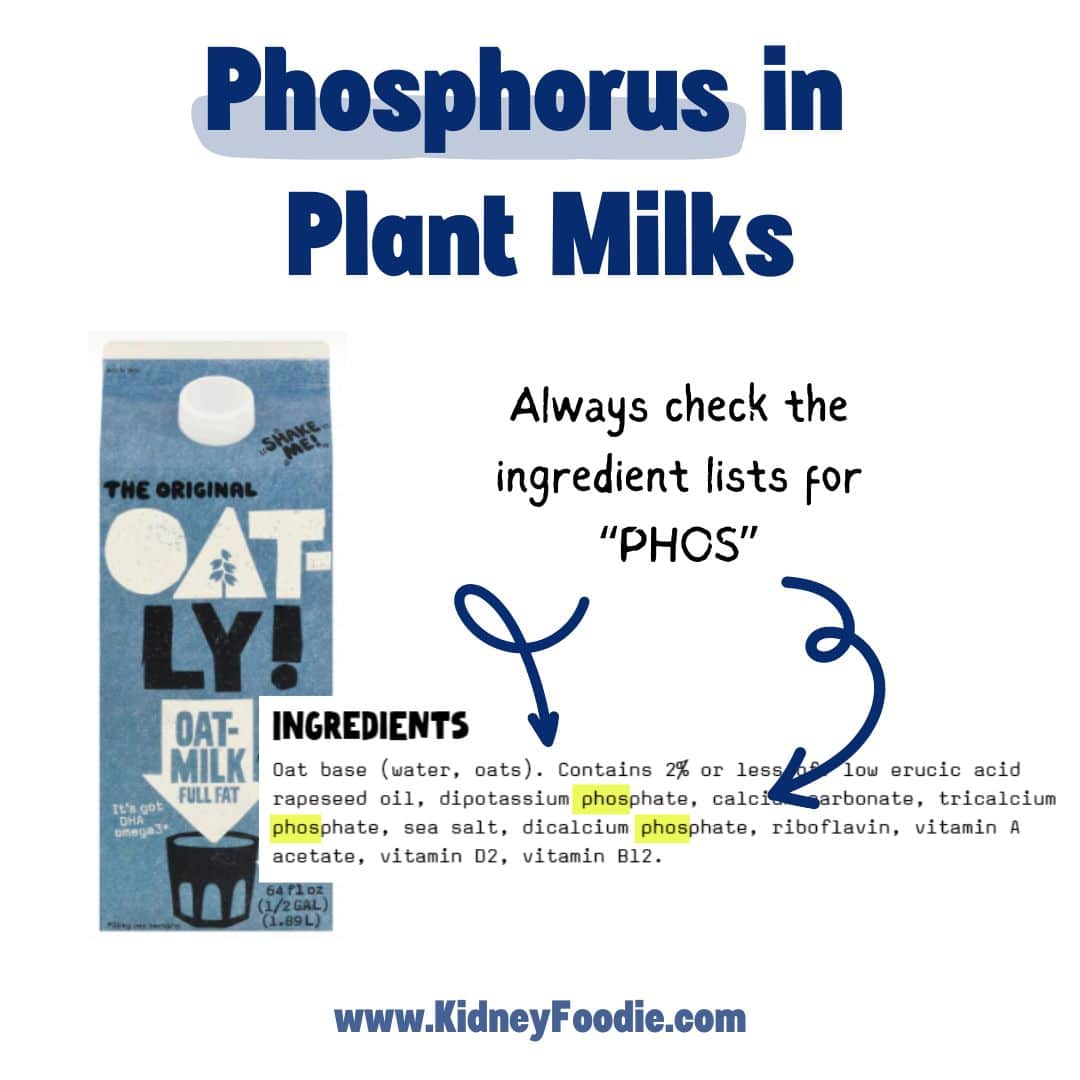
When looking at plant-based milks, we want to be sure to look at the ingredient lists to ensure that they do not contain any phosphorus additives. If you see “PHOS” in any of the ingredients, you’ll want to choose a different milk. Fortunately, there are many options available – just keep scrolling!
Sodium
For most foods, we recommend looking at the nutrition facts labels to find foods that contain less sodium than calories. With plant-based milks and milk alternatives, this can get a bit tricky. Many of these milks are very low in calories, so even a little bit of added sodium means that these milks will usually have more sodium than calories. However, the overall amount of sodium is not that high. The small amount of excess sodium found in a plant-based milk can easily be offset by make lower sodium choices the rest of your day.
If you’ve watched the videos in Kidney Foodie Academy and checked out the meals, you know how to create meals and mealplans that end up very low sodium. You will have a bit of discretionary salt available to use on other foods in your day. A plant based milk may be where you want to “spend” some of your extra salt.
Potassium
Depending on your stage of kidney disease and many other factors, you or may not need to worry about the potassium content of your milk. However, if your dietitian has told you to be mindful of your potassium intake, you will want to check the labels and find a milk that is lower in potassium – preferably less than 200mg per serving.
One cup of cow’s milk can have 390mg of potassium in it. Most plant-based milks will be much lower in potassium. The options listed below in this article contain as little as 35mg of potassium per one cup serving.
Many people with CKD do not need to limit their potassium intake. In some cases, it can even be harmful to restrict potassium. Be sure to talk to your kidney dietitian before eliminating foods from your diet because of their potassium content.
Calcium
When many people think of milk, the first nutrient to come to their mind is often calcium. Calcium is important for maintaining healthy bones and also plays a role in important body functions like your heart beat and muscle contractions. Like most nutrients and chronic kidney disease, it is important to get the right balance of calcium in your diet.
The KDOQI Guidelines (these are expert guidelines on managing kidney disease) suggest that people with chronic kidney disease aim for 800 – 1,000mg of calcium per day. This amount includes all calcium that you get from foods, supplements, and medications.
Depending on what else you are eating in a day, what supplements you take, and what medications you take, you may or may not want a milk that is high in calcium. Most plant based milks are marketed to people who are wanting a replacement for cow’s milk that will still help them meet their calcium goals, so most plant milks will contain a high amount of calcium.
If you need a low calcium milk substitute, I recommend checking out the coconut and rice milk sections below.
Now let’s start reviewing different types of milk!
Is Almond Milk Good for Kidneys?
Yes, almond milk is a good choice for people with kidney disease because it is low in protein and there are many options that contain zero phosphorus additives. Almond milk is also typically lower in potassium. Many almond milks contain added calcium, which may be helpful depending on your needs. If you have CKD and diabetes, then I would recommend choosing a milk that is lower in added sugar. Some people prefer to buy unsweetened milks and add their own zero calorie sweetener to taste, depending on what they are using the milk for.
Califia Farms Extra Creamy Almond Milk
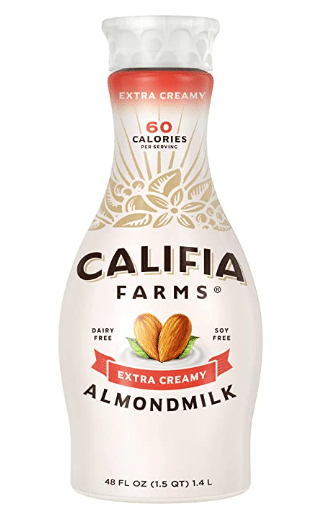
- Calories: 60
- Protein: 1g
- Carbohydrate: 6g
- Fat: 3.5g
- Sodium: 140mg
- Phosphorus
Additives: None - Potassium: 70mg
- Calcium: 440mg
- Fiber: 1g
- Sugar: 5g
Califia Farms Unsweetened Almondmilk
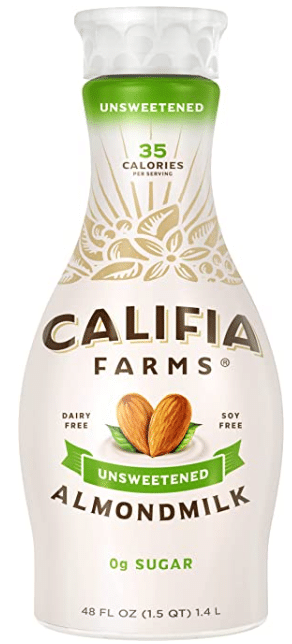
- Calories: 35
- Protein: 1g
- Carbohydrate: 1g
- Fat: 3g
- Sodium: 140mg
- Phosphorus
Additives: None - Potassium: 60mg
- Calcium: 440mg
- Fiber: 1g
- Sugar: 0g
Blue Diamond Almond Milk
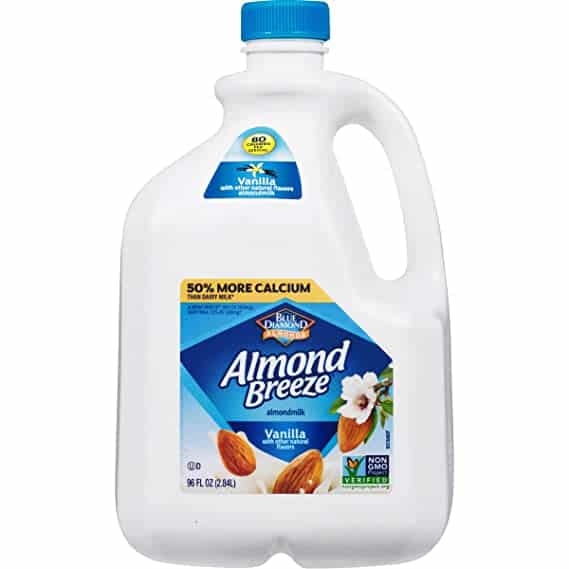
- Calories: 80
- Protein: 1g
- Carbohydrate: 14g
- Fat: 2.5g
- Sodium: 150mg
- Phosphorus
Additives: None - Potassium: 170mg
- Calcium: 450mg
- Fiber: 1g
- Sugar: 12g
Almond Breeze Unsweetened Almond Milk
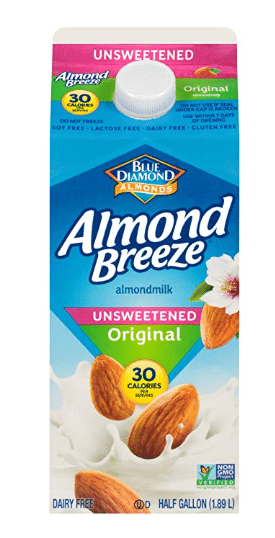
- Calories: 30
- Protein: 1g
- Carbohydrate: 1g
- Fat: 2.5g
- Sodium: 170mg
- Phosphorus
Additives: None - Potassium: 160mg
- Calcium: 450mg
- Fiber: 1g
- Sugar: 0g
Silk Almondmilk
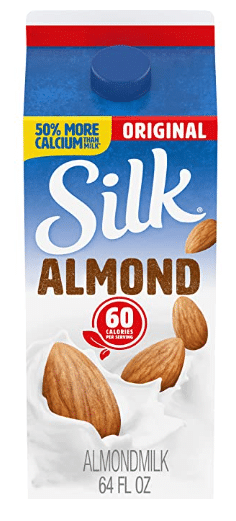
- Calories: 60
- Protein: 1g
- Carbohydrate: 8g
- Fat: 2.5g
- Sodium: 150mg
- Phosphorus
Additives: None - Potassium: 170mg
- Calcium: 450mg
- Fiber: 0g
- Sugar: 7g
Kirkland Unsweetened Almond Milk
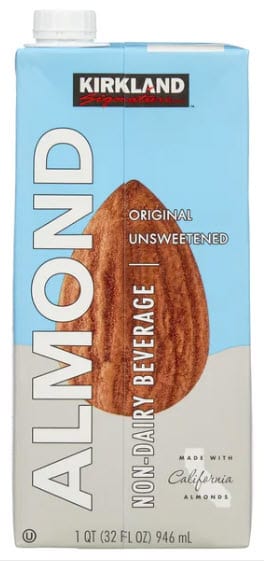
- Calories: 30
- Protein: 1g
- Carbohydrate: 1g
- Fat: 2.5g
- Sodium: 110mg
- Phosphorus
Additives: None - Potassium: 35mg
- Calcium: 600mg
- Fiber: 1g
- Sugar: 0g
Almond Malk
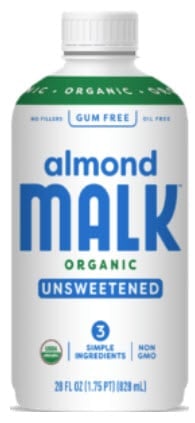
- Calories: 70
- Protein: 2g
- Carbohydrate: 3g
- Fat: 6g
- Sodium: 140mg
- Phosphorus
Additives: None - Potassium: 80mg
- Calcium: 40mg
- Fiber: 3g
- Sugar: 0g
Moolala Almond Milk
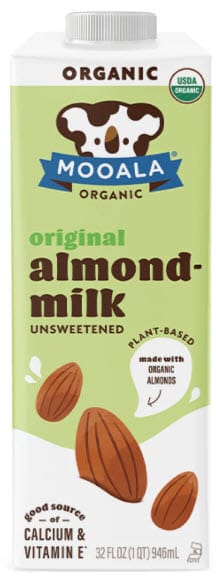
- Calories: 40
- Protein: 2g
- Carbohydrate: 2g
- Fat: 3.5g
- Sodium: 120mg
- Phosphorus
Additives: None - Potassium: 50mg
- Calcium: 150mg
- Fiber: 1g
- Sugar: 0g
Note: Many store brands also offer their own version of almond milk. Many of these are low in protein and contain no phosphorus additives and will have similar amounts of potassium and calcium.
Is cashewmilk good for kidneys?
Cashew milk is a newer type of milk with fewer options than other types of milk. The ones that we found below are both relatively low in protein and potassium and contain no phosphorus additives. One of them is surprisingly low in sodium while the other is surprisingly high in fat – either could be a good option depending on your needs.
Forager Cashew Milk
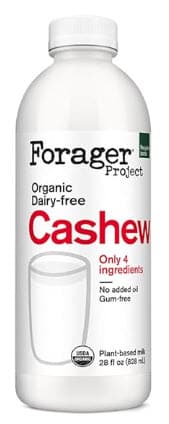
- Calories: 100
- Protein: 3g
- Carbohydrate: 8g
- Fat: 2g
- Sodium: 25mg
- Phosphorus
Additives: None - Potassium: 111mg
- Calcium: 29mg
- Fiber: 1g
- Sugar: 2g
Elmhurst Milked Cashews
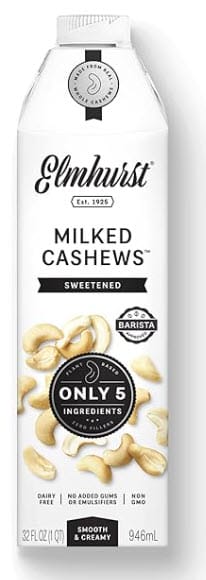
- Calories: 130
- Protein: 4g
- Carbohydrate: 8g
- Fat: 10g
- Sodium: 85mg
- Phosphorus
Additives: None - Potassium: 0mg
- Calcium: 0mg
- Fiber: 0g
- Sugar: 0g
Is Coconut Milk Good for Kidneys?
Yes, Coconut Milk is low in protein, making it a great choice for people with Chronic Kidney Disease. However, many coconut milks contain additives, so you will need to read the ingredient labels carefully to find one that may be appropriate. Coconut milks also contain a lot of calcium. Talk to your dietitian to see if a high calcium milk substitute is appropriate.
365 Coconut Milk
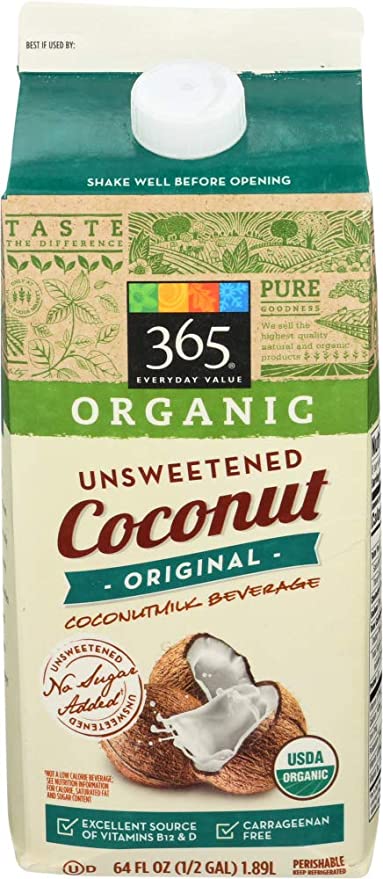
- Calories: 50
- Protein: 0g
- Carbohydrate: 1g
- Fat: 5g
- Sodium: 30mg
- Phosphorus
Additives: None - Potassium: 35mg
- Calcium: 140mg
- Fiber: 0g
- Sugar: 0g
Califia Farms Coconut Milk

- Calories: 45
- Protein: 0g
- Carbohydrate: 1g
- Fat: 4g
- Sodium: 140mg
- Phosphorus
Additives: None - Potassium: 90mg
- Calcium: 460mg
- Fiber: 0g
- Sugar: 1g
Is Cow’s Milk Good for Kidneys?
Cow’s milk is higher in protein and potassium compared to milk substitutes, so many people with kidney disease prefer to go with a plant-based milk substitute.
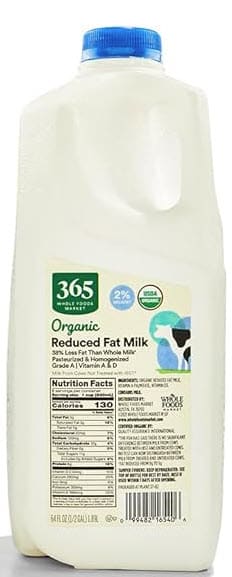
- Calories: 130
- Protein: 8g
- Carbohydrate: 12g
- Fat: 5g
- Sodium: 120mg
- Phosphorus
Additives: None - Potassium: 350mg
- Calcium: 290mg
- Fiber: 0g
- Sugar: 0g
Is Oat Milk Good for Kidneys?
The vast majority of oat milks on the market contain very high amounts of phosphorus (up to 400mg per cup!). We recommend avoiding oat milk that has a phosphorus additive. If you need a calcium fortified milk, we found only one option below that does not contain a phosphorus additive.
Oatsome Organic Oat Milk
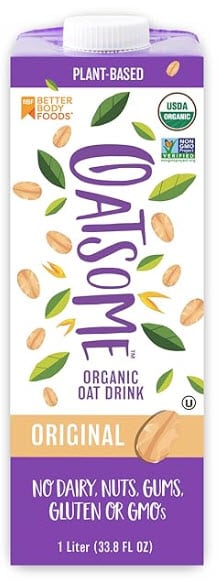
- Calories: 130
- Protein: 2g
- Carbohydrate: 21g
- Fat: 4g
- Sodium: 60mg
- Phosphorus
Additives: None - Potassium: 104mg
- Calcium: 289mg
- Fiber: 0g
- Sugar: 13g
Oatly Super Basic Oatmilk
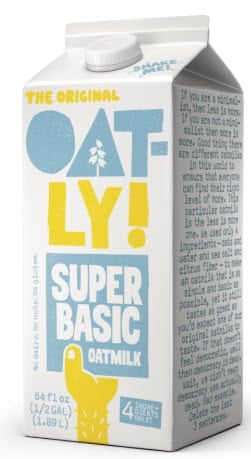
- Calories: 80
- Protein: 3g
- Carbohydrate: 16g
- Fat: 1g
- Sodium: 110mg
- Phosphorus
Additives: None - Potassium: 70mg
- Calcium: 0mg
- Fiber: 2g
- Sugar: 7g
Califia Organic Oat Milk
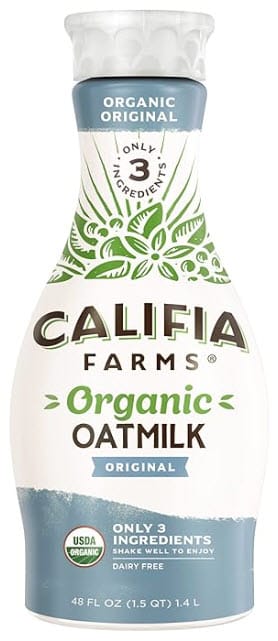
- Calories: 80
- Protein: 3g
- Carbohydrate: 14g
- Fat: 1g
- Sodium: 160mg
- Phosphorus
Additives: None - Potassium: 50mg
- Calcium: 30mg
- Fiber: 0.5g
- Sugar: 4g
Elmhurst Oat Milk
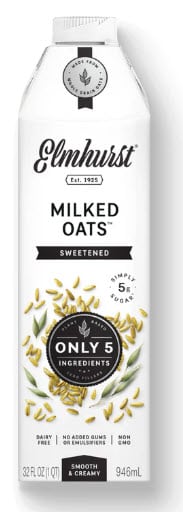
- Calories: 100
- Protein: 3g
- Carbohydrate: 18g
- Fat: 1.5g
- Sodium: 120mg
- Phosphorus
Additives: None - Potassium: 95mg
- Calcium: 18mg
- Fiber: 2g
- Sugar: 5g
Forager Oatmilk
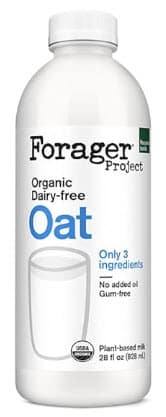
- Calories: 130
- Protein: 2g
- Carbohydrate: 27g
- Fat: 2g
- Sodium: 70mg
- Phosphorus
Additives: None - Potassium: 106mg
- Calcium: 33mg
- Fiber: 3g
- Sugar: 5g
Kirkland Oat Milk
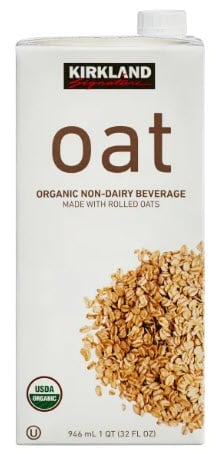
- Calories: 120
- Protein: 3g
- Carbohydrate: 16g
- Fat: 5g
- Sodium: 95mg
- Phosphorus
Additives: None - Potassium: 50mg
- Calcium: 390mg
- Fiber: 2g
- Sugar: 7g
Oat Malk
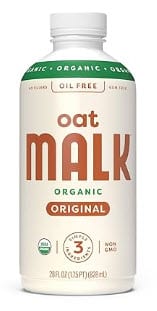
- Calories: 90
- Protein: 3g
- Carbohydrate: 15g
- Fat: 1.5g
- Sodium: 180mg
- Phosphorus
Additives: None - Potassium: 110mg
- Calcium: 0mg
- Fiber: 1g
- Sugar: 5g
Is Pea Milk Good for Kidneys?
No, most pea protein milk substitutes contain phosphorus additives and are typically higher in protein. We do not recommend them.
Is Rice Milk Good for Kidneys?
Rice milks (typically called rice drinks) are typically low in protein and sodium and very low in potassium. The calcium and phosphorus content can vary widely though. For example, Rice Dream makes a “Classic” rice drink and an “Enriched” rice drink. The “Classic” contains no phosphorus additives and is low in calcium, while the enriched contains added phosphorus and is high in calcium. For people with kidney disease, we would recommend the “classic” version. For individuals who need a calcium fortified milk substitute, we recommend choosing a different milk substitute that is fortified with a phosphate-free calcium.
Rice Dream Drink Vanilla Classic
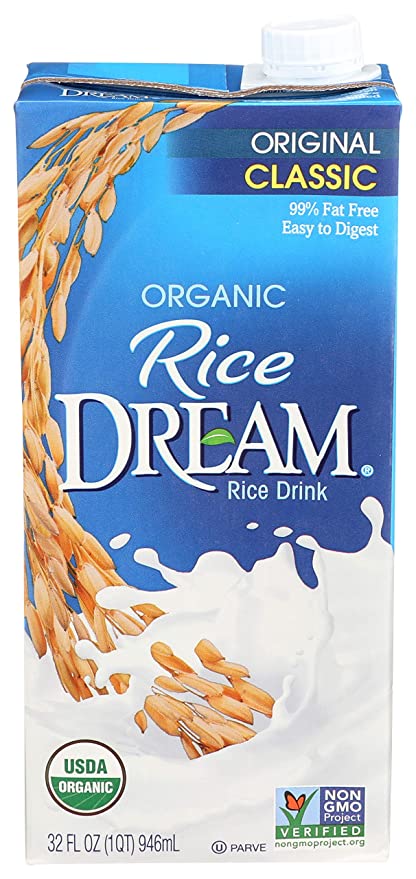
- Calories: 120
- Protein: 1g
- Carbohydrate: 23g
- Fat: 2.5g
- Sodium: 95mg
- Phosphorus
Additives: None - Potassium: 30mg
- Calcium: 20mg
- Fiber: 0g
- Sugar: 12g
Is Soy Milk Good for Kidneys?
Soy milk tends to be higher in protein and potassium, which make it an undesirable choice for most people with kidney disease. Many soy milks also contain phosphorus additives.
Silk Unsweetened Soy Milk
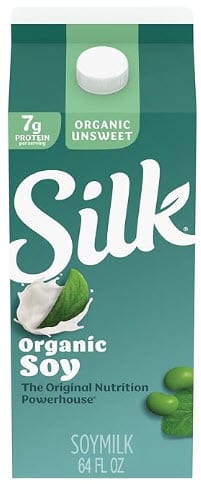
- Calories: 80
- Protein: 7g
- Carbohydrate: 4g
- Fat: 4.5g
- Sodium: 80mg
- Phosphorus
Additives: None - Potassium: 300mg
- Calcium: 300mg
- Fiber: 2g
- Sugar: 0.5g
To Summarize
Almond Milk, Coconut Milk, and Rice Milk are going to be the best milk options for people living with Chronic Kidney Disease. These come in numerous types that are low in protein and contain no phosphorus additives.

